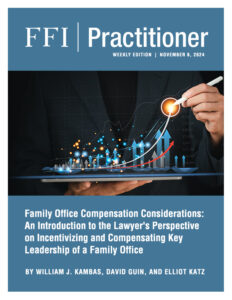
View this edition in our enhanced digital edition format with supporting visual insight and information.
Thank you to William J. Kambas, David Guin, and Elliot Katz for this article, which provides a high-level introduction to the complex topic of compensation and incentive systems for family office leadership.
Introduction
Family office leadership can make or break the success of the office within the family enterprise. It is important for goals and objectives to be aligned between the family (clients) and the office leadership and key personnel (managers). Many variables go into designing appropriate compensation, bonus, and incentive systems such as roles and responsibilities, choice of entity, tiered entity structures, cash flow, longevity and commitment expectations, and expectations for growth. With the growth and familiarity of professionally managed alternative investment opportunities (private equity, hedge, venture capital, and real estate funds), there has been a trend towards implementing incentive-based compensation in family offices as well, especially compensation with a long-term horizon.
This article provides a high-level introduction to a complex topic applied to three important positions in the single family office: chief executive officer, chief investment officer, and chief learning officer.
Embracing Complexity and Variability
While family offices were historically characterized as “wealth preservers,” with the goal of trying to protect assets from market turbulence and potential losses, many family offices of the twenty-first century shifted to “wealth generators,” looking to invest in sophisticated and alternative asset classes for uncorrelated or asymmetrical returns. This has influenced the type of professionals that some family offices seek to hire and the compensation offered to them.
In trying to compensate key positions in a fair, reasonable, and competitive manner, a family office may find the options and opportunities both costly and complex. There are many categories of service providers, ranging from the family office’s chief executive officer and chief investment officer, both of whom are heavily involved with the investment selection and management processes, and other c-suite employees (e.g., a chief learning officer, operating officer, and compliance officer), who may not deal with the investment selection process but who nevertheless play a pivotal role in the day-to-day operation of the family office and its success in the broader family enterprise.
Chief Executive Officer
A CEO generally oversees office operations as a whole, focusing on execution, efficiency, cohesion, and may also get involved in certain investment decisions. With respect to CEOs and other C-suite executives, there is a growing expectation that some amount of the executive’s compensation would be incentive-based. But this begs a question of what is being incentivized. Family office CEOs are focused on financial capital of the family enterprise, but not solely on the financial capital. The success of family (client) cohesion and the family enterprise often depends on appropriate attention to the family’s human capital, the intellectual capital of each individual, and the ability of each individual to work together with a shared sense of stewardship for one another and the enterprise as a whole. Moving toward ideals, the CEO may also be sensitive to supporting shared views and purpose among all forms of family capital—a sort of true north or a guiding objective to the activities of the family office and the enterprise it serves.
With respect to short-term and annual bonuses, which are typically paid in cash, a CEO’s annual bonus would be based on objectively determinable performance criteria, although there may be a discretionary component to the bonus as well.
One feature of short-term incentives that has become increasingly prevalent in family offices is the deferral of bonuses, which can be useful with respect to tax planning. For U.S. based family offices, to make sure that any deferrals are structured in accordance with Internal Revenue Code Section 409A, it is best to review any potential deferrals with legal counsel in connection with the initial implementation of a bonus program.
With respect to CEOs who run a family office at a high level without direct involvement in investments, a long-term incentive arrangement such a profit-sharing arrangement, with performance goals that are tied to the family office’s overall performance, may be most appropriate.
At the same time, some CEOs are more directly involved in investments, and some family offices have accordingly made carried interest opportunities available to CEOs. Depending on the types of investments that are made by the family office, such opportunities can be provided in the form of carried interest, co-investment rights, or phantom equity arrangements.
The “phantom equity” form of award can be advantageous and has an element of practicality that other types of awards lack, because a phantom equity award can incentivize employees for a short multiyear period. However, family offices and the family decision makers supporting those family offices need to be mindful of the need for funding such awards in the absence of a liquidity event.
In some instances, co-investment opportunities may be appropriate as well. Factors to be considered here include the timeframe of the executive, the size of the investment relative to the executives’ net worth, whether the co-investment can be structured such that the dollar level exposure of the family can be satisfied first, and whether there are potential conflicts of interests between the executive and the family.
Additionally, family offices can offer loans to help the executives buy into these investments. Ensure that these loans are structured as “bona fide” loans for tax purposes to avoid potential adverse tax consequences. It is advisable to consult legal counsel to confirm the tax treatment of such loans.
Chief Investment Officer
Those family offices that consider the generation of capital to be a key part of their mandate may employ one or more sophisticated investment professionals, such as former fund managers. Even family offices that are focused more on wealth preservation will want to engage with sophisticated economists and those with appropriate investment experience. Family office investors are often characterized as patient capital because of historic tendencies to understand and adapt to the nuances of changing markets and specialized businesses. Whether patient capital or active traders, it is beneficial for the family office investment team leadership and direction and to be incentivized consistently with the family’s (and family fiduciary’s) cash flow and investment goals and objectives, measured in both short- and long-term horizons.
While the family office team as a whole may be involved in the investment process, the chief investment officer is typically at the helm. The appropriate compensation structure for an experienced chief investment officer can vary depending on the types of investments that are made by the family office. While chief investment officers typically receive cash compensation in the form of salary and an annual bonus, the other components of their compensation often depend on the types of investments that they are involved with:
- Private Equity/Venture Capital: Carried interest arrangements are most common for chief investment officers who focus on venture capital and private equity investments.
- Real Estate: Carried interest arrangements are often utilized with respect to real estate investments, and co-investment may be appropriate as well.
- Public Equities: A “phantom equity” scheme that pays out based on the performance of the investment portfolio and that is not tied to specific investments would be appropriate.
- Family Business: Co-investment (approximating but distinguished from an employee stock ownership plan) may be appropriate. One important consideration in structuring long term incentive awards is whether the family office intends to hold its investments indefinitely or intends to have an exit event take place at some point. With respect to family offices that don’t intend to dispose of the businesses that they own (which may often be the case with respect to family business), the LTI would have to be structured to provide for payment based on the business’s performance over a multi-year period. However, funding such an arrangement in the absence of liquidity may be challenging, and that is important for the family office to consider when structuring such arrangements.
Chief Learning Officer
It may also be beneficial for family offices to incentivize the chief learning officer with incentive compensation instruments (typically paid out in the form of cash) that are based on short- and long-term performance. The consideration of performance in the context of non-investment-specific family office executives becomes a new and subjective question for family members and family fiduciaries. In these cases, short-term incentive awards are typically discretionary and are generally not tied to financial metrics. Long-term incentive awards are based on the family’s broader performance and are not tied to particular investments or portfolios. These awards often consist of deferred cash payouts (either interests in the family office or “synthetic” shares in various portfolios) that vest over a three- to five-year period, based on continued service and the attainment of performance criteria, (which is, ideally, tailored to each respective family enterprise).
Performance criteria for a role like a chief learning officer (or other operations and/or coherence officers) might potentially be inspired by alternatives to the economics of gross domestic product. For example, the OECD Better Life Index reflects aspects of individual well-being across eleven topics that relate to material living conditions (housing, income, jobs) and quality of life (community, education, environment, governance, health, life satisfaction, safety and work-life balance) of those in the enterprise. It is important to ensure that any such awards are either exempt from or compliant with Section 409A, especially if such awards provide for deferral features or payment upon events such as a termination of service or a change in control.
DISCLAIMER: The views expressed in this article are those of the authors only. The information contained in this article is provided solely for informational purposes. This article does not constitute legal or tax advice or create an attorney-client relationship.
Reference
1 OECD. “OECD Better Life Index.” Accessed October 25, 2024. https://www.oecdbetterlifeindex.org/
About the Contributors

William J. Kambas is a partner on the private client and tax team at Withers Bergman. He focuses his practice tax planning for multi-national and multi-state personal, active business, and investment activities. An integral part of Bill’s practice involves assisting families and/or their family offices with the formation, management, and/or periodic evaluation of multinational and/or multi-generational centralized control and management structures. To contact him, visit https://www.withersworldwide.com/en-gb/people/william-kambas.
 David Guin is a corporate partner and serves as the US leader of Withers Bergman’s business division. He advises clients on a range of issues governed by the US Securities Laws and other regulatory matters. He devotes a significant amount of time to advising high net worth domestic and international individuals, families, family offices, and their advisors. To contact him, visit https://www.withersworldwide.com/en-gb/people/david-guin.
David Guin is a corporate partner and serves as the US leader of Withers Bergman’s business division. He advises clients on a range of issues governed by the US Securities Laws and other regulatory matters. He devotes a significant amount of time to advising high net worth domestic and international individuals, families, family offices, and their advisors. To contact him, visit https://www.withersworldwide.com/en-gb/people/david-guin.

Elliot Katz is special counsel on Withers Bergman’s corporate team. His practice focuses on employment law, executive compensation, and employee benefits issues. He advises clients on the structure, implementation and administration of executive compensation, equity compensation, qualified and nonqualified deferred compensation plans, programs, and arrangements, including ERISA, federal tax, accounting and securities implications. To contact him, visit https://www.withersworldwide.com/en-gb/people/elliot-katz.

View this edition in our enhanced digital edition format with supporting visual insight and information.





